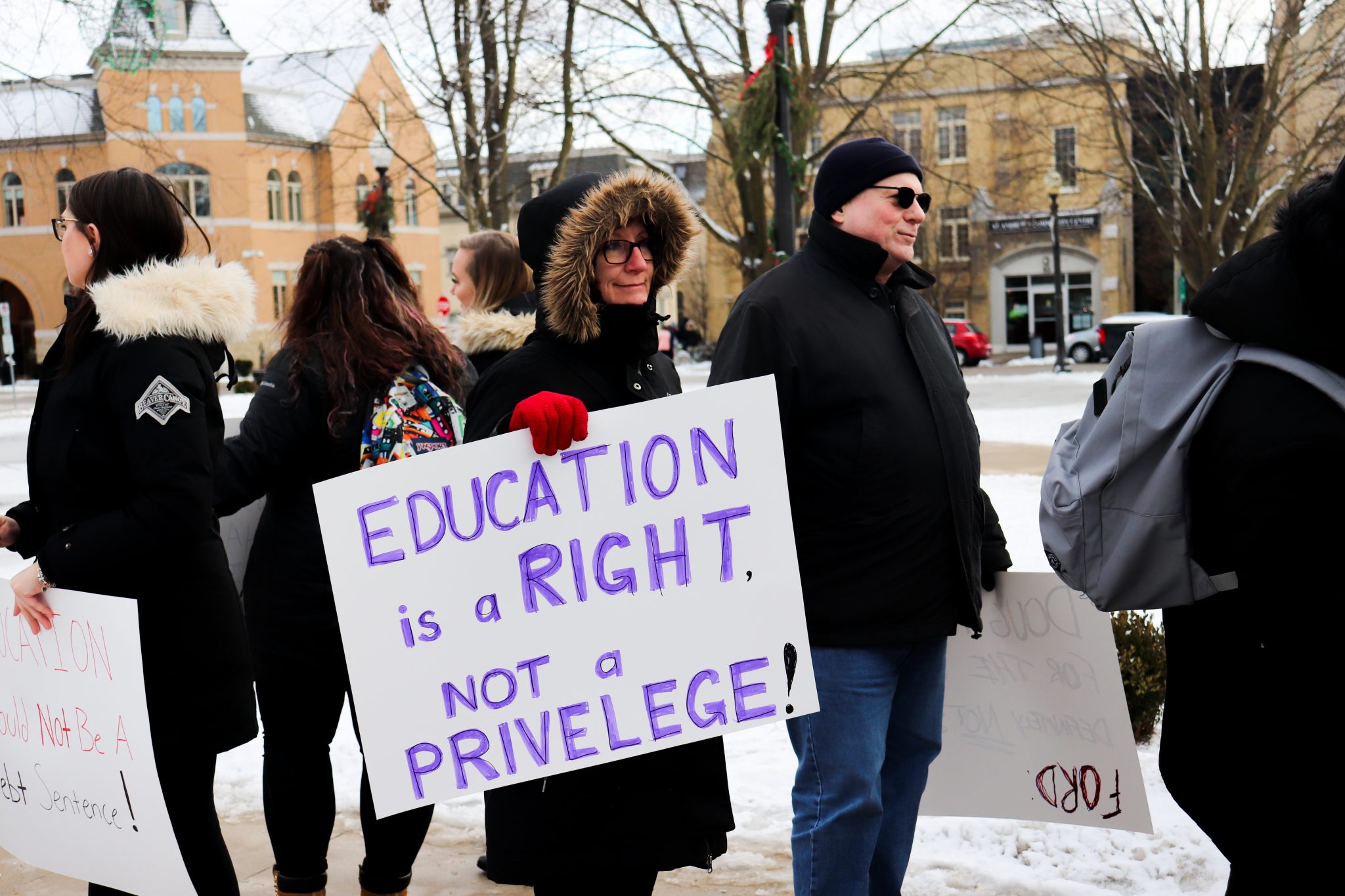PHOTO BY LIZ SHIRO / SPUTNIK CONTRIBUTOR
Elementary and secondary teachers in Brantford and Brant-County go on strike to fight for the quality of education after the province fails to negotiate with ETFO and OSSTF as of Jan. 15.
On Jan. 21st, more than 1,100 faculty and staff members of the Elementary Teachers’ Federation of Ontario (ETFO), 850 members of the Ontario English Catholic Teachers’ Association (OECTA), and 2,000 members of the Ontario Secondary School Teachers’ Federation (OSSTF) picketed their signs in protest of recent changes to the education system.
Strikes took place from 9 a.m. to 3:30 p.m. as picketers braved the cold, splitting the protests into a morning and an afternoon shift.
“The fight for better quality education for a day is worth it,” said David Shaver, secondary teacher of 25 years at Tollgate Technological Skills Centre.
He, along with 100 OSSTF members from three other secondary schools marched in front of the Brantford Collegiate Institute. Onlookers driving by honked in support of teachers as they walked up and down King George Rd to intersections Richmond Street and back to Waterloo Street.
Legislation of increased class sizes were implemented as of September last year for the 2019 to 2020 school year.
“It wasn’t something that was negotiated, even with five to eight more students in the classroom, I can’t get around to each student,” said Shaver, “students have even mentioned that it’s a lot more difficult because of less contact time.”
Changes to the education system include cuts to funding school programs and assistance to special needs students. In addition, class sizes are being raised from 22 to 28 students, limiting few teachers to large class sizes such as 100 students enrolled in an online course. Lastly, moving school curriculum to online learning which not all students are able to access due to not having a computer or internet at home.
“For the students that might be at higher risk of deciding that they are not going to attend school, those are the ones that we really want to keep in the classroom, if they have questions, they need that one-on-one time to be successful,” he said.
Funding cuts are also affecting class choices for secondary students when choosing which courses to take. Laiyla Valarie-Grappie, 17, attending Brantford Collegiate Institute says that the changes have led to discontinuation of courses in the Arts such as film and drama classes.
“It seems as though everything is being forced,” she said, “now, [students] will need more resources as they will instead rely on technology.”

“It changes how students learn in the classroom from students communicating with the teacher, students asking questions, not everyone has the same learning ability, some need to listen instead of just reading on a screen,” she continued.
Class divisions that end up having too few students enrolled can lead to cancellation of the course for the semester. Limited selection for certain courses can lack motivation and interest in students to attend their classes.
“I teach [physical education and health] and have noticed, especially with the larger classes, that there are not as many options across the different grade levels for the students,” said Shaver.
Parents also have added stress finding babysitters and additional daycare services for school children in elementary and nursery as the strike calls for school closures. Moreover, the strikes have also made students uncertain of whether final examinations will be pushed back or put on hold.
“I know that parents are frustrated with these one-day walk outs, but I think… [for] the long-term, they will realize that we need to support the public education system the way it has been built up,” he said.
Minister of Education, Stephen Lecce, announced the province is offering compensation to parents whose children that have been affected by the strikes as of Jan. 15. Parents whose children from zero to age 12 may be eligible to receive up to $60 per day.
However, some believe money is not going to fix these problems in the education system.
“You can’t buy back our education or, our time,” says Jude Jarvis, 40, intermediate teacher at Woodman Cainsville Elementary Public School, “parents have said to me that if they do apply, they will use that money to put it back into the education system.”
Karlo Fortino, 47, acting President from the OECTA says if the unions and the province do not come to an agreement, there is a possibility that strike action will escalate.




